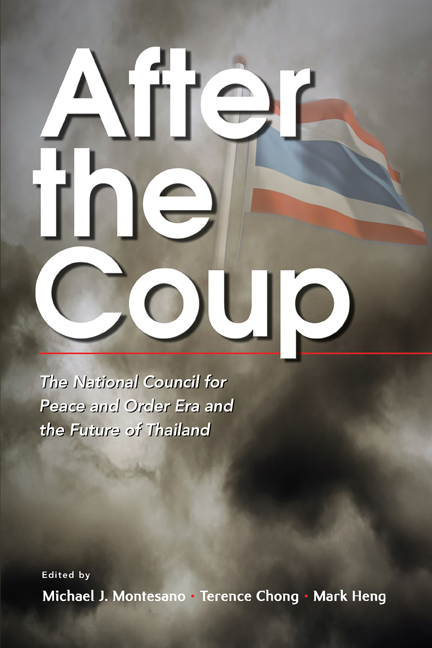Book contents
- Frontmatter
- Contents
- About the Contributors
- 1 Introduction: Thai Realities and Possibilities after the 22 May Coup
- 2 The Rise of the Thai Upper Middle Class and its Turn against Democracy
- 3 “We the Southerners Come to Protect the Nation and the King”: Southerners’ Political Rise and Regional Nationalism in Thailand
- 4 Exit, Voice, (Dis)loyalty? Northeast Thailand after the 2014 Coup
- 5 The Red Shirts and their Democratic Struggle in Northern Thailand, April 2010 – May 2015
- 6 The Shifting Battleground: Peace Dialogue in Thailand's Malay-Muslim South
- 7 Thailand's Zigzag Road to Democracy: Continuity and Change in Military Intervention
- 8 Murder and Regress: Violence and Political Change in Thailand
- 9 Thailand's Politics of Decentralization: Reform and Resistance before and after the May 2014 Coup
- 10 Change and Continuity in the Politics of the Media after the Coup
- 11 Thailand's Royal Democracy in Crisis
- 12 The Foreign Press and its Changing Perceptions of the Thai Monarchy
- 13 Thai Economic Growth: Retrospect and Prospect
- 14 Features and Challenges of an Ageing Population in Thailand
- 15 Conclusion: Thailand in Transition
- Bibliography
- Index
4 - Exit, Voice, (Dis)loyalty? Northeast Thailand after the 2014 Coup
Published online by Cambridge University Press: 23 May 2019
- Frontmatter
- Contents
- About the Contributors
- 1 Introduction: Thai Realities and Possibilities after the 22 May Coup
- 2 The Rise of the Thai Upper Middle Class and its Turn against Democracy
- 3 “We the Southerners Come to Protect the Nation and the King”: Southerners’ Political Rise and Regional Nationalism in Thailand
- 4 Exit, Voice, (Dis)loyalty? Northeast Thailand after the 2014 Coup
- 5 The Red Shirts and their Democratic Struggle in Northern Thailand, April 2010 – May 2015
- 6 The Shifting Battleground: Peace Dialogue in Thailand's Malay-Muslim South
- 7 Thailand's Zigzag Road to Democracy: Continuity and Change in Military Intervention
- 8 Murder and Regress: Violence and Political Change in Thailand
- 9 Thailand's Politics of Decentralization: Reform and Resistance before and after the May 2014 Coup
- 10 Change and Continuity in the Politics of the Media after the Coup
- 11 Thailand's Royal Democracy in Crisis
- 12 The Foreign Press and its Changing Perceptions of the Thai Monarchy
- 13 Thai Economic Growth: Retrospect and Prospect
- 14 Features and Challenges of an Ageing Population in Thailand
- 15 Conclusion: Thailand in Transition
- Bibliography
- Index
Summary
We are now entering the era of Lao civilization…
Interview, Khon Kaen, 9 June 2015The informants in this Red Shirt community seemed deadly serious. Bangkok and the whole of the Central Plains would soon be under water, thanks to climate change. Khorat would become a port city, and the Thai capital would move to Khon Kaen. Already, many people from Southern and Central Thailand had bought plots of land in Isan, ready to pull up stakes once the waters rose. Those from the rest of the country would be welcome to move to Isan, the villagers hastened to add, but their ominous references to the 2004 tsunami suggested that le déluge might conveniently sweep away large swathes of Thailand's population. Yuk lao siwilai, however, was already upon us, evinced by the superior 4G phones and imminent Chinese-built high speed trains of Laos itself. Thai dominance was over, and it was only a matter of time — less than seven years, one speaker insisted — before nature took its course.
The apocalyptic discourse of yuk lao siwilai or the era of Lao civilization works on many levels. It contains an implicit triumphalism: the underdog will finally have its day, as the predominantly Lao population of the Northeast, or Isan, gains the upper hand over long-dominant Bangkok. The discourse also plays on the extraordinary range of national anxieties that have plagued Thailand in the new millennium, including those relating to the royal succession; concerns that the country's pre-eminent position in mainland Southeast Asia is threatened by dynamic rivals, notably Myanmar and Vietnam, and by the emerging new regional order of ASEAN Economic Community; and deep-rooted if unreasonable fears, inflamed by colour-coded political divisions, that Thailand's arbitrary borders contain within them the seeds of frustration and dissent that could sprout into secessionism and an eventual re-drawing of the national map (Darin 2012, pp. 34–35).
For better or worse, yuk lao siwilai is an extremely crude example of wish fulfilment, a collective fantasy that Isan could triumph over Bangkok without the need to lift a finger. It is a narrative that reflects an unequal power relationship, in which Isan/Lao attempts to resist Bangkok/Thai dominance have proved a heroic failure for centuries.
- Type
- Chapter
- Information
- After the CoupThe National Council for Peace and Order Era and the Future of Thailand, pp. 90 - 113Publisher: ISEAS–Yusof Ishak InstitutePrint publication year: 2019



